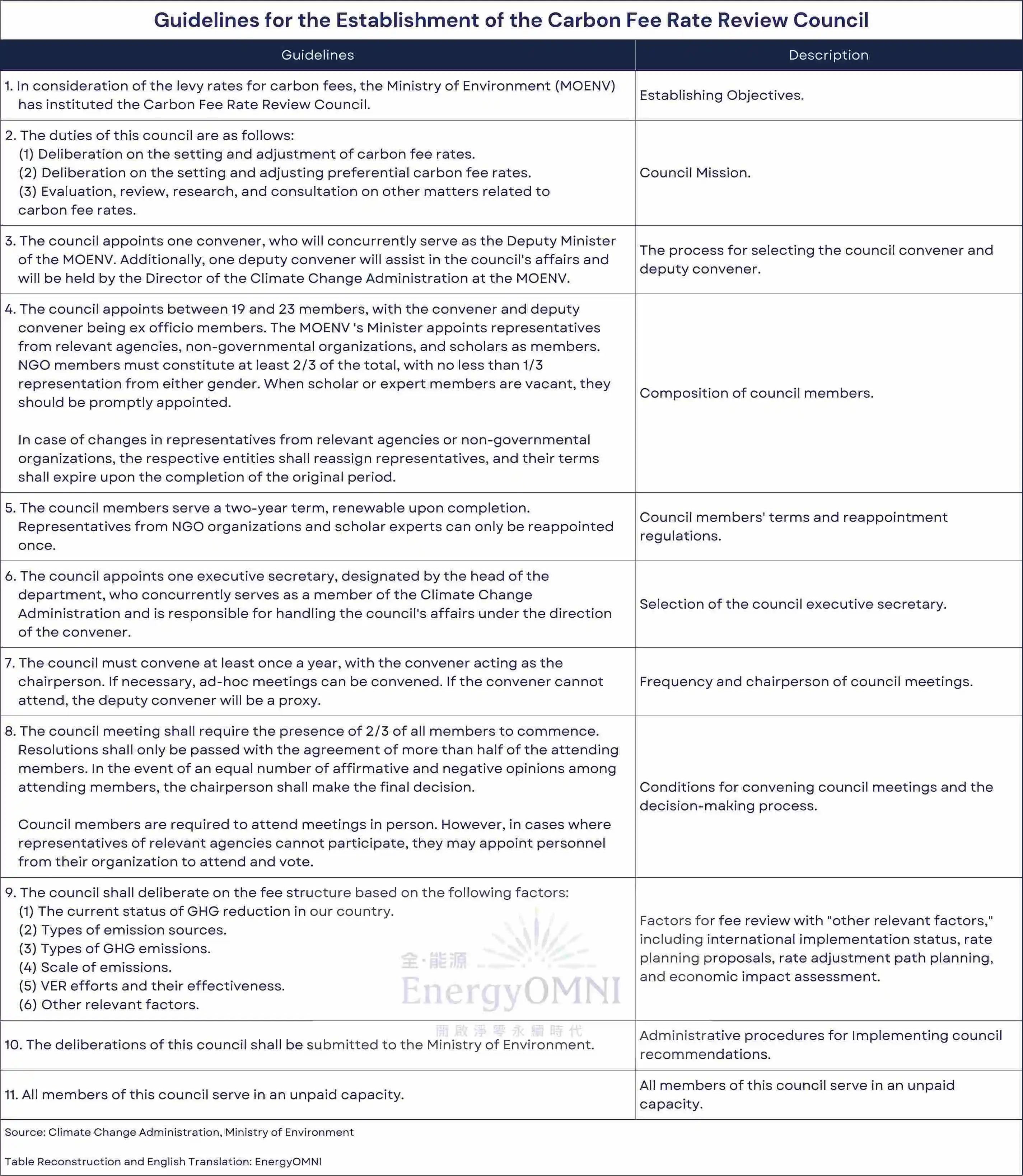The "Guidelines for the Establishment of the Carbon Fee Rate Review Council" has been issue on December 1st, 2023
The "Guidelines for the Establishment of the Carbon Fee Rate Review Council" has been issue on December 1st, 2023

In an effort to advance the implementation of carbon pricing in our nation, the Ministry of Environment issued the "Guidelines for the Establishment of the Carbon Fee Rate Review Council" on December 1st, 2023. These guidelines provide a clear framework for the composition and operational procedures of the Carbon Fee Rate Review Council members. Commencing from the year 2024, the Ministry of Environment has highlighted that the annual greenhouse gas emissions of carbon fee payers will be included in the pricing structure. As Article 28 of the Climate Change Adaptation Act stipulated, the Council will review the collection rates, and upon approval, the Ministry will officially announce them. The unveiling of these guidelines during the ongoing global carbon reduction discussions at the Conference of the Parties of the UNFCCC (COP28) in Dubai on November 30th reflects Taiwan's commitment to international collaboration and the gradual realization of carbon reduction goals.
Taiwan has outlined its Pathway to Net-Zero Emissions in 2050, amending the "Climate Change Response Act" and presenting 12 Key Strategies with specific action plans. Simultaneously, Taiwan has initiated the implementation of a carbon fee system. Draft regulations for the carbon fee collection are expected to be officially announced to the public by the end of 2023.
The Ministry of Environment anticipates convening a rate review committee in the first quarter of next year. According to the "Carbon Fee Rate Review Committee Establishment Guidelines," the committee will be chaired by the Deputy Minister of the Ministry of Environment, with the Director of the Climate Change Administration as the vice-chair. The committee will consist of 19 to 23 members appointed by the minister, representing government agencies, non-governmental organizations, and scholarly experts. External members, excluding government officials, must constitute at least two-thirds of the committee, with a minimum of one-third gender representation to uphold gender equality principles.
The World Meteorological Organization (WMO) forecasts that this year's global temperatures will surpass the pre-industrial revolution average by 1.4 degrees Celsius, setting a record as the hottest year to date. On November 20th, the UN Environment Programme (UNEP) released the "Emission Gap Report 2023," which highlighted that global greenhouse gas emissions reached an all-time high last year (2022), with about 80% of the historical cumulative emissions originating from the Group of Twenty (G20) industrialized nations.
Notably, only nine countries among them have legally enshrined net-zero targets, and merely ten have formulated action plans. The report cautions that if current policies persist, global temperatures could rise by 3°C. Taiwan's approach is distinctive, explicitly incorporating net-zero targets into law and adopting a UN global inventory methodology on a five-year cycle for comprehensive carbon reduction assessments.
Taiwan's carbon reduction performance is evident in the latest statistics from international organizations. According to the most recent Emissions Database for Global Atmospheric Research (EDGAR) published by the Joint Research Centre (JRC), global carbon dioxide emissions from fuel combustion increased by 27% compared to 2005. In contrast, Taiwan reduced emissions by 7%, ranking significantly lower than the global average. In the Asian region, Taiwan's performance is second only to Japan, which achieved a 16% reduction. Notably, the commonly cited Climate Change Performance Index Results (CCPI) by Germanwatch, with its impractical evaluation criteria, fails to reflect nations' actual climate change efforts accurately. This leads to countries with effective carbon reduction ranking lower than those without significant achievements.
Taiwan will consistently align with global efforts to achieve climate action centered around pursuing the 1.5°C temperature target. The country is committed to pragmatically advancing its 2050 net-zero pathway and 12 ey Strategic initiatives. With the enactment of climate change response laws and regulations, Taiwan is set to enter the era of carbon pricing in 2024, initiating the collection of carbon fees. This initiative is complemented by various measures such as Voluntary Emission Reduction (VER) and incremental offsetting, aiming to intensify reduction efforts and steadfastly work towards achieving the 2050 net-zero emission goal.

